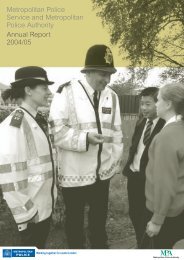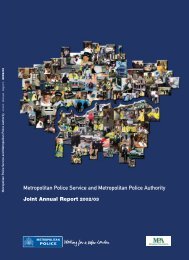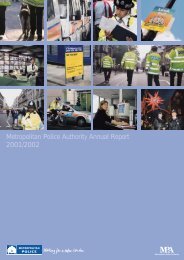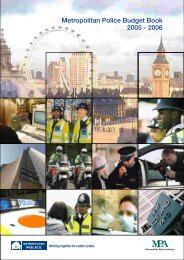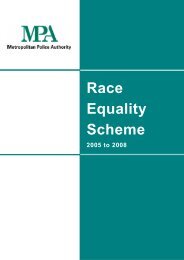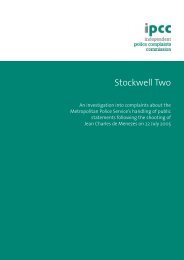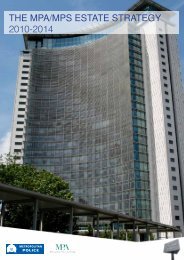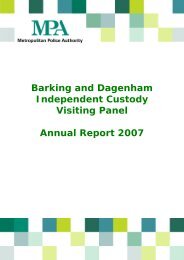Final Report of the Morris Inquiry: The Case for Change
Final Report of the Morris Inquiry: The Case for Change
Final Report of the Morris Inquiry: The Case for Change
You also want an ePaper? Increase the reach of your titles
YUMPU automatically turns print PDFs into web optimized ePapers that Google loves.
THE CASE FOR CHANGE<br />
increased chance <strong>of</strong> resolving <strong>the</strong> dispute where <strong>the</strong> parties actively<br />
communicate with each o<strong>the</strong>r. <strong>The</strong> tendency to get on with preparing<br />
<strong>the</strong> Tribunal case and to abandon fur<strong>the</strong>r settlement discussions should<br />
be resisted.<br />
● Does <strong>the</strong> Applicant simply want an apology? In a number <strong>of</strong> <strong>the</strong> cases we<br />
looked at, <strong>the</strong> Applicant made it clear from <strong>the</strong> outset that he or she was<br />
merely seeking an apology. It is not possible to lodge a claim simply to<br />
obtain an apology. <strong>The</strong>se cases might have been settled earlier and more<br />
economically if management had been prepared to admit to errors and<br />
apologise. We found evidence <strong>of</strong> <strong>the</strong> ‘blame culture’ we have referred to<br />
elsewhere in this report.<br />
● Learning lessons from Employment Tribunal cases. We consider that it would<br />
be helpful to <strong>the</strong> MPS if a pro <strong>for</strong>ma were to be kept recording <strong>the</strong> reasons<br />
<strong>for</strong> settlement. <strong>The</strong>re is a need to monitor management practice and<br />
responses to workplace conflicts to ensure that proper steps are taken to<br />
resolve disputes at an early stage. In addition, where things go wrong<br />
(which is inevitable) lessons can be learnt. Annual reviews <strong>of</strong> trends and<br />
lessons to be learnt from Employment Tribunal cases should become<br />
common practice within <strong>the</strong> MPS. We are greatly encouraged by <strong>the</strong> MPS’<br />
response that <strong>the</strong>y already do this.<br />
4.138 We are asked in note 5 to our terms <strong>of</strong> reference to consider “whe<strong>the</strong>r<br />
<strong>the</strong>re should be arrangements <strong>for</strong> employment tribunal claims, particularly those involving<br />
allegations <strong>of</strong> discrimination or harassment, to be subject to independent review as part<br />
<strong>of</strong> <strong>the</strong> MPS handling <strong>of</strong> such cases, in order to encourage and facilitate ef<strong>for</strong>ts to achieve<br />
resolution by agreement.”<br />
4.139 While we have not received extensive evidence on this point, we are firmly<br />
<strong>of</strong> <strong>the</strong> view that <strong>the</strong> MPS should manage its own disputes and problems without<br />
involving external assistance. We are, <strong>the</strong>re<strong>for</strong>e, not persuaded that external review<br />
would assist <strong>the</strong> organisation in <strong>the</strong> long term.<br />
96


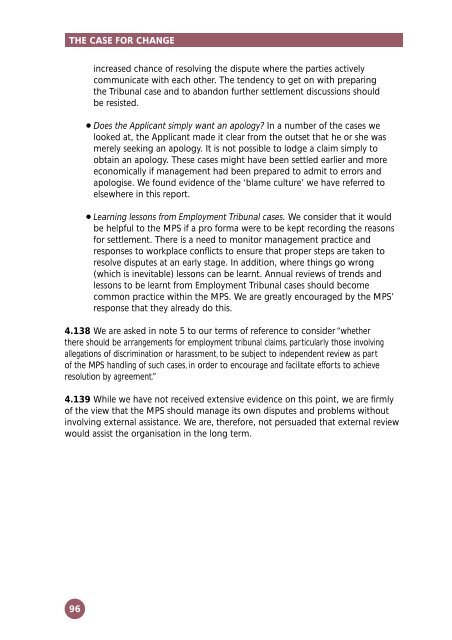
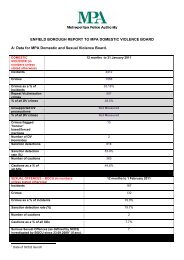
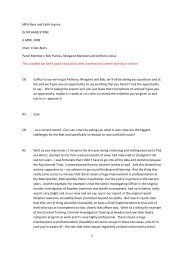
![Appendix 1 [PDF]](https://img.yumpu.com/51078997/1/184x260/appendix-1-pdf.jpg?quality=85)
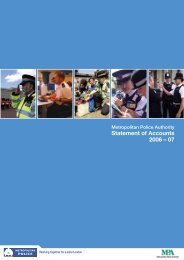
![Transcript of this meeting [PDF]](https://img.yumpu.com/50087310/1/184x260/transcript-of-this-meeting-pdf.jpg?quality=85)
![Street drinking in Hounslow [PDF]](https://img.yumpu.com/49411456/1/184x260/street-drinking-in-hounslow-pdf.jpg?quality=85)
